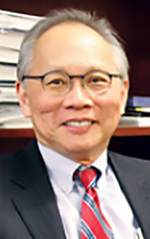Defending Values: The Case for Strategic Clarity
Speaking Out
BY ROBERT S. WANG
Speaking Out is the Journal’s opinion forum, a place for lively discussion of issues affecting the U.S. Foreign Service and American diplomacy. The views expressed are those of the author; their publication here does not imply endorsement by the American Foreign Service Association. Responses are welcome; send them to journal@afsa.org.
During his term in office over the past four years, President Joe Biden highlighted the global struggle between democracies and autocracies and underscored the need for the United States to help defend and strengthen the post–World War II rules-based liberal international order.
For this effort, the administration inaugurated and co-hosted an annual Summit for Democracy with the participation of leaders from up to 100 countries who have made a range of specific commitments to advance human rights and democracy, counter authoritarianism, and fight corruption.
At the same time, the United States provided crucial military assistance to Ukraine in the wake of Russia’s invasion and built and strengthened security alliances in Europe and Asia, while increasing worldwide development assistance and taking measures to respond to China’s increasingly aggressive and coercive political, military, and trade policies.
In its February 2022 “Indo-Pacific Strategy of the United States” document, the Biden administration specifically called attention to the mounting challenges in the region, particularly citing Beijing’s actions “from the economic coercion of Australia to the conflict along the Line of Actual Control with India to the growing pressure on Taiwan and bullying of neighbors in the East and South China Seas. … In the process, the PRC is also undermining human rights and international law, including freedom of navigation, as well as other principles that have brought stability and prosperity to the Indo-Pacific.”
Nonetheless, while calling for collective efforts to address these challenges, the strategy states: “Our objective is not to change the PRC [emphasis added] but to shape the strategic environment in which it operates, building a balance of influence in the world that is maximally favorable to the United States, our allies and partners, and the interests and values we share.”
This phrasing deliberately avoids stating clearly the ultimate goal of getting China, itself, to accept and abide by the values and principles of the rules-based liberal international order, which the United States has worked to promote globally since the end of WWII and to advance with respect to China since establishment of diplomatic relations with the PRC in 1979.
In so doing, the administration appears to be acknowledging the difficulty of achieving this goal (without being accused of seeking “regime change”) while continuing “to manage our competition with the PRC responsibly.”
Beijing’s Narrative: Interests vs. Values
Meanwhile, Beijing has continued to promote its narrative that the U.S.-China rivalry is primarily a competition of national interests as opposed to values. That is, the United States as a status quo power is seeking to contain and suppress China as a rising power (popularized in the concept of the “Thucydides Trap”).
In April 2013, shortly after Xi Jinping assumed power, the Chinese Communist Party (CCP) issued an internal communiqué (“Document Nine”) warning that “Western anti-China forces” were seeking to spread Western ideas and values (such as constitutional democracy, universal values, civil society, and freedom of the press) and cultivating so-called “anti-government forces” within China to subvert CCP rule and prevent China’s rise.
This was followed by a crackdown against human rights lawyers, media outlets, academics, and other such independent thinkers within China; against the Uyghur minority in Xinjiang; and, later, the people of Hong Kong. This Beijing narrative has served to mobilize populist and nationalist anti-U.S. sentiment within China to justify the CCP’s increasingly tight political controls.
Abroad, Beijing has also sought to promote the same narrative while utilizing trade and investment ties, e.g., through the Belt and Road Initiative (BRI), as well as acts of economic coercion intended to expand China’s economic and political influence.
To the extent that this narrative prevails, it lends support to those who argue against having to choose between the United States and China, focusing instead on protecting and advancing their countries’ own interests in the context of this geopolitical rivalry.
In a series of essays published by the United States Institute of Peace (USIP) in 2023, for example, scholars from the 10 Association of Southeast Asian Nations (ASEAN) countries were asked to address the issue of how each of their countries has viewed and responded to U.S.-China geopolitical competition in the region.
A summary of these essays concluded that “they all emphasized developmental security and strategic diversification as priorities” to protect and advance their own national interests without reference to issues of human rights and international law. Notably, “none of the papers featured especially prominently the importance of the United States as an economic partner. In contrast, China’s economic initiatives and expanded economic relations with individual states loomed large.”
Highlighting the views of these countries, Indonesia’s then President-elect Prabowo Subianto said in an interview with Al Jazeera in May 2024 that his administration would maintain an open foreign policy approach and not be drawn into choosing sides between the United States and China as they compete for global influence.
“Our guiding philosophy is to be friends with all countries,” Subianto said. “We invite the U.S., the Japanese, the Koreans, the Europeans. The fact that we are friends with you doesn’t mean we can’t be friends with China, India, Russia.”
Defending Values and Interests
While cognizant of the difficulty of “changing China” and the need to engage diplomatically with Beijing, I would argue here that it is critical that the United States openly and directly challenge the Beijing narrative by making clear, first to the Chinese people, that our strategic goal has never been to suppress China’s rise but rather to encourage and convince the government in Beijing that it needs to change many of its current policies, which undermine the fundamental values and principles of the rules-based liberal international order from which China has greatly benefited.
We need to underscore that the United States and the West have helped China achieve its remarkable rise over the past 50 years with the hope and expectation that it will eventually assume the role of a “responsible stakeholder” in this international order.
I certainly believed this to be our goal while I served several tours in China during the past 30 years, working with my colleagues to expand trade and investment relations through China’s eventual accession to the World Trade Organization (WTO), facilitating the travel of millions of Chinese students to the United States, and building broad government and people-to-people ties between our two countries.
At the same time, we should make explicit to those countries that have chosen not to take sides that they have, in fact, chosen to accept Beijing’s narrative, thus ignoring or even denigrating the values of the liberal international order, implicitly condoning China’s practices and fueling its threat to this order.
Although the United States cannot make other countries choose sides, we should at least warn them that unless Beijing changes and abides by the rules and principles of this order, it may eventually pose a threat to their own interests, if those conflict with China’s interests as Beijing further extends its sphere of influence.
We have already witnessed this during the past decade in the Indo-Pacific region, especially in the East and South China Seas. As Beijing has significantly expanded its aggressive military and gray-zone activities, both Japan and the Philippines have now become increasingly aware of the dangers of neutrality and are beginning to work with the United States to respond to Beijing’s threats.
Beijing has continued to promote its narrative that the U.S.-China rivalry is primarily a competition of national interests as opposed to values.
Similarly, Beijing’s continued support for the DPRK and its nuclear arms program should be a clear warning not only to Korea and others in the region but even beyond the region with the DPRK now sending its own troops to assist Russian forces in Ukraine.
While we should continue to counter Beijing’s coercive policies by reshaping critical supply chains and offering alternative development incentives, i.e., shaping the strategic environment, I believe that we must also get more countries to recognize the serious risks of Beijing’s continued challenge to the values of the rules-based international order and its eventual effect on peace and stability in the region.
Finally, we need to point out more broadly that if Beijing does not fundamentally change its policies, it poses an existential threat to the long-term interest of the entire global community as Beijing continues to assist other powerful and aggressive authoritarian states that transgress and violate the rights of other countries and erode the rules-based liberal international order.
This threat is becoming increasingly clear today, with China first declaring its “no limits” partnership with Russia at a Xi-Putin summit meeting in Beijing just before the Russian invasion of Ukraine in 2022 and subsequently refusing to impose sanctions on Russia while continuing to provide critical assistance that has allowed Russia to expand its war against Ukraine.
In a continued show of defiance, Xi and Putin held three summits in 2024, each time reaffirming their partnership against the United States and the West. In October, Xi traveled to Kazan in western Russia, where Putin hosted a meeting of BRICS, the intergovernmental organization of Brazil, Russia, India, China, South Africa, Egypt, Ethiopia, and the United Arab Emirates that has now expanded its membership to include Iran.
Separately, Xi traveled to France, Serbia, and Hungary last May in an apparent effort to sow division within Europe and weaken U.S.-European ties.
As China, Russia, and other autocracies join together to expand their influence, we are facing the very real risk of a return to an even more dangerous “Cold War” that could potentially have devastating consequences for the entire world.
The Bottom Line
The bottom line of my argument is that the United States itself must adhere to and continue to promote the rules-based liberal international order. And we must underscore that if Beijing continues to violate the values and principles of this order, China’s continued rise will eventually, directly and indirectly, pose an existential threat to the peace and prosperity of the global community.
Understanding this, the United States must be forthright in stating our strategic objective, which is to induce China to change, and we must try to get our like-minded partners and others to understand the seriousness of this challenge. “Not taking sides” is taking sides.
This will not be an easy task as Beijing continues to promote its narrative and wield its considerable economic power and influence, especially among those who do not share these values or those who continue to focus solely on their immediate economic interests.
Nonetheless, I believe that greater strategic clarity regarding our goal with respect to China is especially critical at this time, because Beijing’s increasingly assertive and expansive policies have begun to raise concerns in the region and around the world.
Within China, we must continue to speak up for universal values and contest and dispel the notion that the United States wants to suppress China’s rise or seeks regional hegemony, understanding that it will ultimately be up to the Chinese people themselves to choose their own path forward.
When sharing or linking to FSJ articles online, which we welcome and encourage, please be sure to cite the magazine (The Foreign Service Journal) and the month and year of publication. Please check the permissions page for further details.
Read More...
- “China’s Economic Growth: Source of Disorder?” by Robert S. Wang, The Foreign Service Journal, May 2005
- “Is American Diplomacy with China Dead?” by Susan A. Thornton, The Foreign Service Journal, July-August 2019
- “Engagement with China: Was it a Mistake?” by Robert Griffiths, The Foreign Service Journal, June 2021





